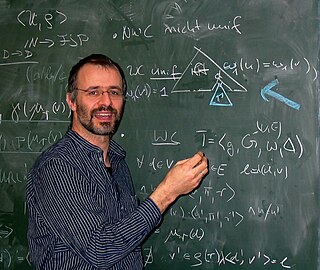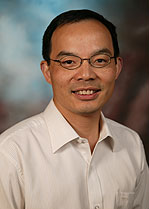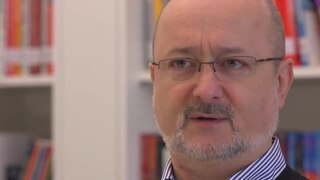
The School of Computer Science (SCS) at Carnegie Mellon University in Pittsburgh, Pennsylvania, US is a leading private school for computer science established in 1988. It has been consistently ranked among the top computer science programs over the decades. U.S. News & World Report currently ranks the graduate program as tied for 1st with Massachusetts Institute of Technology, Stanford University, and University of California, Berkeley.

Dabbala Rajagopal "Raj" Reddy is an Indian-American computer scientist and a winner of the Turing Award. He is one of the early pioneers of Artificial Intelligence and has served on the faculty of Stanford and Carnegie Mellon for over 50 years. He was the founding director of the Robotics Institute at Carnegie Mellon University. He was instrumental in helping to create Rajiv Gandhi University of Knowledge Technologies in India, to cater to the educational needs of the low-income, gifted, rural youth. He is the chairman of International Institute of Information Technology, Hyderabad. He is the first person of Asian origin to receive the ACM Turing Award, in 1994, the highest award in computer science, for his work in the field of artificial intelligence.
Michael John Witbrock is a computer scientist in the field of artificial intelligence. Witbrock is a native of New Zealand and is the former Vice President of Research at Cycorp, which is carrying out the Cyc project in an effort to produce a genuine Artificial Intelligence.
Human-centered computing (HCC) studies the design, development, and deployment of mixed-initiative human-computer systems. It is emerged from the convergence of multiple disciplines that are concerned both with understanding human beings and with the design of computational artifacts. Human-centered computing is closely related to human-computer interaction and information science. Human-centered computing is usually concerned with systems and practices of technology use while human-computer interaction is more focused on ergonomics and the usability of computing artifacts and information science is focused on practices surrounding the collection, manipulation, and use of information.

David S. Touretzky is a research professor in the Computer Science Department and the Center for the Neural Basis of Cognition at Carnegie Mellon University. He received a BA in Computer Science at Rutgers University in 1978, and earned a master's degree and a Ph.D. (1984) in Computer Science at Carnegie Mellon University. Touretzky has worked as an Internet activist in favor of freedom of speech, especially what he perceives as abuse of the legal system by government and private authorities. He is a notable critic of Scientology.

Kai-Fu Lee is a Taiwanese-born American computer scientist, businessman, and writer. He is currently based in Beijing, China.
Randal E. Bryant is an American computer scientist and academic noted for his research on formally verifying digital hardware and software. Bryant has been a faculty member at Carnegie Mellon University since 1984. He currently teaches course in computer systems with Professor David R. O'Hallaron. He served as the Dean of the School of Computer Science(SCS) at Carnegie Mellon from 2004 to 2014.

The Human-Computer Interaction Institute (HCII) is a department within the School of Computer Science at Carnegie Mellon University (CMU) in Pittsburgh, Pennsylvania. It is considered one of the leading centers of human-computer interaction research, and was named one of the top ten most innovative schools in information technology by Computer World in 2008. For the past three decades, the institute has been the predominant publishing force at leading HCI venues, most notably ACM CHI, where it regularly contributes more than 10% of the papers. Research at the institute aims to understand and create technology that harmonizes with and improves human capabilities by integrating aspects of computer science, design, social science, and learning science.
Michael Loren "Fuzzy" Mauldin is a retired computer scientist and the inventor of the Lycos web search engine.
Arie Nicolaas Habermann, often known as Nico Habermann, was a noted Dutch computer scientist.

Alan W. Black is a Scottish computer scientist, known for his research on speech synthesis. He is a professor in the Language Technology Institute at Carnegie Mellon University in Pittsburgh, Pennsylvania.

Jaime Guillermo Carbonell is a computer scientist who has made seminal contributions to the development of natural language processing tools and technologies. His extensive research in machine translation has resulted in the development of several state-of-the-art language translation and artificial intelligence systems. He earned his B.S. degrees in Physics and in Mathematics from MIT in 1975 and did his Ph.D. under Dr. Roger Schank at Yale University in 1979. He joined Carnegie Mellon University as an assistant professor of computer science in 1979 and has lived in Pittsburgh since then. He is currently affiliated with the Language Technologies Institute, Computer Science Department, Machine Learning Department, and Computational Biology Department at Carnegie Mellon.

Michael Kohlhase is a German computer scientist and professor at Friedrich-Alexander University Erlangen-Nürnberg, where he is head of the KWARC research group.

Xuedong Huang is a Chinese-American computer scientist and the key person behind Microsoft's spoken language processing technologies. He is a Microsoft Technical Fellow and company's Chief Speech Scientist. Wired magazine named him one of 25 Geniuses in Next List 2016.
George G. Robertson is an American information visualization expert and Senior Researcher, Visualization and Interaction (VIBE) Research Group, Microsoft Research. With Stuart K. Card, Jock D. Mackinlay and others he invented a number of Information Visualization techniques.
Louis-Philippe Morency is a French Canadian researcher interested in human communication and machine learning applied to a better understanding of human behavior.
Prof Chen Tsuhan is the Deputy President at National University of Singapore. He is currently the Chief Scientist of AI Singapore. Prior to his current appoint he was the Dean of the College of Engineeringat Nanyang Technological University from 2015 to 2017. He was previously Director of the School of Electrical and Computer Engineering at Cornell University from 2009 to 2013. He is also an Honorary Professor in Computer Science at National Chao Tung University, Taiwan.

Alexander "Alex" Waibel is a professor of Computer Science at Carnegie Mellon University and Karlsruhe Institute of Technology. Waibel's research interests focus on speech recognition and translation and human communication signals and systems. Waibel is known for the time delay neural network (TDNN), which he developed. It is the first convolutional neural network (CNN) trained by gradient descent, using the backpropagation algorithm. Alex Waibel introduced the TDNN 1987 at ATR in Japan.
Rayid Ghani was the Director of the Center for Data Science and Public Policy, Research Associate Professor in the Department of Computer Science, and a Senior Fellow at the Harris School of Public Policy at the University of Chicago. He was also the co-founder of Edgeflip, an analytics startup that grew out of the Obama 2012 Campaign, focused on social media products for non-profits, advocacy groups, and charities. Recently, it was announced that he will be leaving the University of Chicago and joining Carnegie Mellon University's School of Computer Science and Heinz College of Information Systems and Public Policy.











